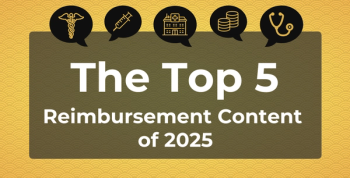
Employers Are Aware of Reference-Based Pricing Potential but Haven't Crossed Over to Adoption, Researchers Report in AJMC® Study
This Trends From the Field article about awareness and adoption of reference-based pricing in The American Journal of Managed Care® comes as the price of medical services is increasingly seen as a driver of the cost of healthcare, even as overall trends level off or stabilize.
(CRANBURY, N.J. — February 12, 2019) - Few employers are using reference-based pricing (RBP) benefit design, even though there is broad awareness of its potential for delivering savings, according to a
The authors, from Harvard T.H. Chan School of Public Health, Harvard Medical School, and Beth Israel Deaconess Medical Center, sought to understand employers’ point of view about RBP as a strategy to engage employees in healthcare decision making, as well as their adoption of and concerns about this type of benefit design.
Under RBP, employees have a financial incentive to use lower-cost providers, usually for nonemergent medical services where a large pool of providers is available. The plan determines a “reference price” for a given medical service, and the plan will cover medical expenses for that service up to the reference price. If a patient chooses a provider whose negotiated price with the plan is above the reference price, the patient is responsible for all costs above the reference price, including all cost sharing.
The paper, “Why Aren’t More Employers Implementing Reference-Based Pricing Benefit Design?” identifies the roadblocks to adopting RBP, as well as three strategies that might boost participation in RBP.
Employers identified several concerns that kept them from implementing RBP designs, including plan complexity, fear of catastrophic out-of-pocket costs, and worries that RBP could hurt employee recruitment in a tight labor market.
“Our interviews revealed that although employers were aware that RBP could lower spending, the difficulty they expected to face to put RBP in place and the possible risks for employees, both current and future, left them deciding it was not worth it,” said lead author Anna D. Sinaiko, PhD, MPP, of Harvard T.H. Chan School of Public Health.
Simplifying the plans, setting out-of-pocket maximums to protect patients from catastrophic costs, and using “turnkey” solutions for communicating the changes to employees could help increase uptake of RBP plans, the authors wrote.
“Solutions that can eliminate employers’ biggest concerns about RBP, such as these, are likely needed if there is to be broader uptake of RBP benefit design than what we are currently seeing in the market,” Sinaiko said.
For the full February issue,
About The American Journal of Managed Care®
The American Journal of Managed Care® (AJMC®) is a peer-reviewed, Medline-indexed journal that keeps readers on the forefront of health policy by publishing research relevant to industry decision makers as they work to promote the efficient delivery of high-quality care. AJMC.com is the essential website for managed care professionals, distributing industry updates daily to leading stakeholders. Other titles in the AJMC® family include The American Journal of Accountable Care® and two evidence-based series, Evidence-Based Oncology™ and Evidence-Based Diabetes Management™. These comprehensive offerings bring together stakeholder views from payers, providers, policymakers and other industry leaders in managed care. To order reprints of articles appearing in AJMC® publications, please contact Gil Hernandez at 609-716-7777, ext. 139.
AJMC® Media Contacts
Alexandra Ventura, 609-716-7777, ext. 121
John Patricolo, 609-325-4630, ext. 133
Newsletter
Stay ahead of policy, cost, and value—subscribe to AJMC for expert insights at the intersection of clinical care and health economics.









